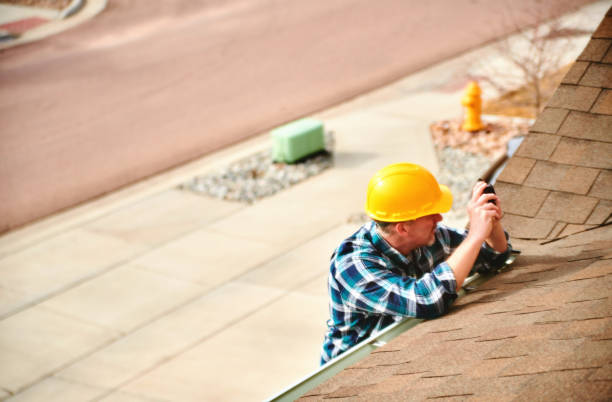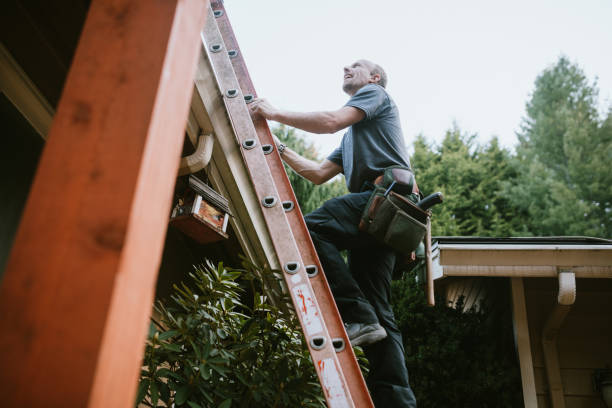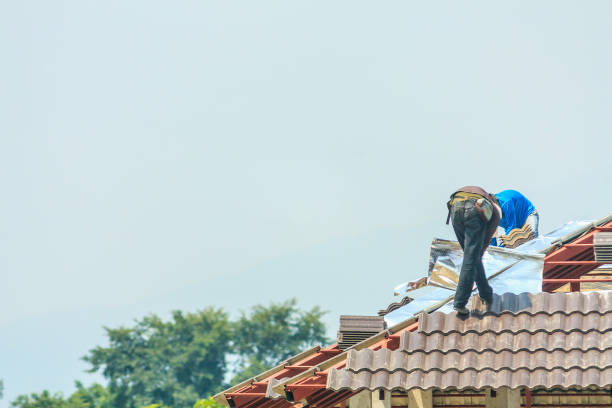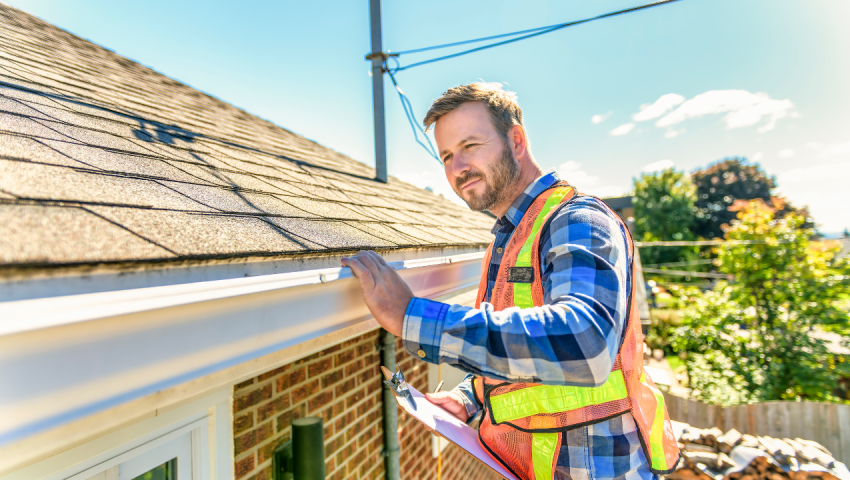Most homeowners overlook the necessity of regular roofing inspections, a critical oversight that can lead to costly repairs. In Cherry Hills Village, CO, where elements conspire against your home’s shield, understanding what goes into a roofing inspection is paramount.
Read on as Peak to Peak Roofing covers essential insights on proper roof inspections.
Understanding Roof Inspections

Importance
Roof inspections are vital for home maintenance. They help spot problems early, saving money and stress. In Cherry Hills Village, CO, a well-maintained roof is crucial due to the area’s climate. Regular checks can prevent minor issues from becoming major expenses.
Proactive care enhances a roof’s lifespan. It ensures that materials function at their best for longer periods of time. Safety is another concern; neglected roofs pose risks such as collapses or leaks that could harm occupants.
Frequency
Experts suggest inspecting roofs twice a year in Cherry Hills Village, CO. Severe weather events may require additional checks. Residents should be mindful of this routine to protect their homes effectively.
Certain signs indicate an immediate need for a roofing inspection:
- Missing or damaged shingles
- Noticeable leaks or water damage inside your home
- Sagging roof sections
These symptoms should prompt homeowners to act swiftly to avoid further damage.
Key Inspection Components

Structure Assessment
The integrity of a roof begins with its structure. Inspectors look for sagging and other deformities that could indicate weakness. They check how even the roof planes are, ensuring no misalignment exists. The soundness of the roof deck is crucial, too; it supports all other roofing materials.
For example, a sagging roof line suggests possible structural issues. Uneven planes may lead to water accumulation, causing damage over time. A solid deck means a stable base for your roofing system.
Material Evaluation
Roofing materials suffer from exposure to the elements. Inspectors examine shingles, tiles, or metal surfaces for signs of wear, such as cracks or curling edges. They look out for rust on metal roofs and rotting in wooden structures.
Materials protect your home from weather damage. Deterioration compromises this shield and leads to leaks or failures. Sealants around vents and chimneys need checking, too; they seal critical junctions against moisture.
Interior Examination
Inspectors don’t stop at the exterior—they venture inside, too, especially in areas like Cherry Hills Village, CO, where the weather can be harsh on homes. In attics, they search for leaks or water stains indicating past or present issues.
Additionally, they meticulously examine the layers of insulation to ensure proper coverage and energy efficiency.
Good insulation keeps energy costs down, while proper ventilation prevents damp conditions in which mold thrives—the presence of either is a red flag during an inspection.
Drainage Systems
Water management is key to prolonging a roof’s life span; hence, inspectors ensure gutters and downspouts are clear of debris.
- Proper drainage steers water away from the foundation.
- Blocked systems cause overflow, which leads to pooling on the surface—a serious concern needing immediate attention.
Clear gutters contribute significantly to preventing water-related damages both at ground level and up above your roofing structure itself.
Types of Roof Inspections
ALT TAG: Building inspector assesses slate roof condition
Visual Assessments
Roof inspectors begin with visual assessments. They scan for damaged shingles or tiles. In Cherry Hills Village, CO, harsh weather can cause wear. Inspectors look for signs like discoloration. This could suggest underlying problems.
They also search for leaks or cracks. These visible cues often indicate more serious issues below the surface.
Infrared Inspections
Next are infrared inspections. Professionals use infrared technology to spot moisture and heat loss areas in roofs across Cherry Hills Village, CO. This method reveals hidden damages that are otherwise invisible.
The benefits of thermal imaging include a comprehensive understanding of a roof’s condition without invasive measures.
Drone Inspections
Finally, there are drone inspections that provide a bird’s-eye view of roofing conditions in hard-to-reach places or on steep slopes common in Cherry Hills Village, CO. Drones capture high-resolution images, allowing detailed analysis from safe distances.
This approach reduces risk as it lessens the need for direct access to the roof during an inspection.
Inspectors can quickly identify problem areas using drones while ensuring their safety and preserving the integrity of your roof structure.
The Inspection Process
Initial Consultation
The first step in a roofing inspection is the initial consultation. Homeowners express their concerns and objectives. This sets the stage for a tailored service in Cherry Hills Village, CO. Inspectors establish clear expectations during this phase.
They may also review any available maintenance records. This helps them understand past work done on the roof.
On-Site Inspection
Next comes the on-site inspection, where inspectors conduct meticulous walk-throughs around and atop your roof in Cherry Hills Village, CO. They document everything meticulously with notes, photos, or videos.
Inspectors use specialized tools to assess slopes and materials accurately. These instruments help identify anomalies that are not visible to the naked eye.
- Documenting findings ensures nothing gets overlooked.
- Specialized equipment provides precise data about your roof’s condition.
Result Interpretation
Finally, inspectors interpret the results into plain language for homeowners in Cherry Hills Village, CO. They prioritize repair needs based on severity and urgency.
This gives homeowners insight into potential future issues as well.
- Translating technical data into understandable advice.
- Prioritizing problems by criticality.
- Highlighting possible future concerns detected during inspection.
Signs of a Thorough Inspection
Checklist Completion
A thorough inspection hinges on meticulous attention to detail. Inspectors must examine every component, from flashings and vents to chimneys. A comprehensive checklist serves as a roadmap, ensuring no element is missed.
- Flashings checked for seal integrity
- Vents inspected for blockages or damage
- Chimneys evaluated for stability and condition
Inspectors should tick off each item methodically. Only when the industry-standard items are reviewed can they confirm a complete roof assessment.
Roofing professionals often have checklists tailored to specific areas, like Cherry Hills Village, CO. These lists account for local weather patterns that could affect roofing materials differently than in other regions.
Detailed Reporting
Post-inspection reports are crucial indicators of inspection quality. A detailed report includes:
- Findings with clear images.
- Recommendations are based on observations.
- Critical concerns requiring immediate action.
Reports should also provide estimated repair timelines and costs where applicable, especially in areas like Cherry Hills Village, where environmental factors may influence urgency and pricing.
In-depth documentation gives homeowners peace of mind, knowing their roof’s status is thoroughly assessed—and any critical issues won’t cause surprises down the line due to oversight during the inspection process.
It’s these signs—checklist completion and detailed reporting—that underscore the diligence of a roofing inspector’s work.
Cost Considerations
Factors Affecting Cost
Roof inspections vary in cost. Size, material type, and accessibility are key variables. In Cherry Hills Village, CO, a larger roof means higher fees due to the more time required. Materials like slate or tile may need special care, increasing prices.
Additional services also impact costs. Drone surveys offer detailed views but add to the bill. Infrared assessments detect moisture invisible to the eye but expect an upcharge for this tech-savvy option.
Local market rates play a role, too. Roofers in high-demand areas often charge more for their expertise.
Average Costs
Prices for roofing inspections differ by region and property type. Residential checks typically cost less than commercial ones due to scale and complexity differences.
Additionally, the cost may vary depending on the specific features and conditions of the property, such as the size of the roof, its material, and the number of foot traffic areas.
Estimating by Size and Location
Square footage directly affects inspection charges; larger roofs require more labor hours, and thus higher costs ensue. Regional variations also exist—harsh climates necessitate frequent reviews, leading to elevated local pricing standards in those areas.
Urban settings generally see steeper rates compared with rural locales due to increased overheads in cities like Cherry Hills Village, CO.
- Inspection cost correlates with size.
- Urban vs. rural dynamics influence pricing disparities.
Post-Inspection Actions

Roof Repairs
After a thorough roofing inspection, identifying repair needs is crucial. Shingle replacement often tops the list in Cherry Hills Village, CO. Inspectors find weathered or missing shingles that require prompt attention.
Repair urgency varies. Some issues need immediate action to prevent water damage. Others are less critical and can wait. It’s about balancing cost and roof health.
Roof Replacements
Sometimes, repairs won’t cut it. When a roof nears its end, replacement becomes necessary. This decision hinges on the lifespan expectations of existing materials.
In cases where replacements are advised, homeowners have choices to make regarding materials. Options like asphalt shingles or metal roofing each come with their own benefits for Colorado homes.
Maintenance Recommendations
Maintenance tips vary based on individual roof conditions in Cherry Hills Village, CO. An inspector might suggest clearing debris after storms or trimming overhanging branches to reduce wear.
Preventative measures help extend a roof’s life post-inspection. Seasonal maintenance routines also play into longevity—like inspecting seals before winter or checking gutters in spring.
Why It’s Time for a Roofing Inspection with Peak to Peak Roofing
Expertise Matters
At Peak to Peak Roofing, knowledge and precision are at the forefront. Our inspectors bring years of experience in identifying potential issues. They spot subtle signs of wear that others may miss. This expertise means they can recommend timely repairs before minor problems become major.
Our team understands diverse roofing materials and their unique challenges. Whether you have shingles, tiles, or metal panels, we know what to look for. We provide detailed reports so homeowners understand their roof’s condition.
Commitment Shines
We don’t just inspect; we commit to excellence in every aspect of our work. At Peak to Peak Roofing, client satisfaction is paramount. Our thorough inspections, including regular roof inspections, cover every nook and cranny of your roof.
Clients trust us because we uphold stringent quality standards during a roofing inspection. We ensure that nothing is overlooked, from flashing around chimneys to gutter systems’ integrity.
Signs It’s Time for a Roofing Inspection in Cherry Hills Village
Regular roofing inspections are crucial for maintaining a home’s integrity. They can reveal hidden damage and prevent costly repairs. Homeowners should be proactive in scheduling these evaluations. A proactive approach ensures that minor issues don’t escalate into major concerns.
Inspections by qualified professionals like Peak to Peak Roofing go beyond surface-level assessments. We provide an in-depth analysis of your roof’s health. This insight is invaluable for extending your roof’s lifespan and enhancing your home’s value.
Don’t wait until you notice damage. Instead, elevate your roof’s potential with proactive care from Peak to Peak Roofing. Reach out to us today!

